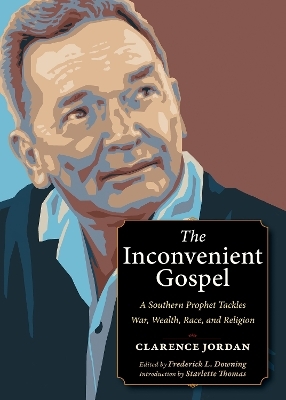
The Inconvenient Gospel
A Southern Prophet Tackles War, Wealth, Race, and Religion
Seiten
2022
Plough Publishing House (Verlag)
978-1-63608-028-4 (ISBN)
Plough Publishing House (Verlag)
978-1-63608-028-4 (ISBN)
“Clarence Jordan spoke with an unwavering prophetic voice. He firmly rejected materialism, militarism, and racism as obstacles to authentic faith… He was a fearless and innovative defender of human rights.” —President Jimmy Carter
On 440 depleted acres in Sumter County, Georgia, a young Baptist preacher and farmer named Clarence Jordan gathered a few families and set out to show that Jesus intended more than spiritual fellowship. Like the first Christians, they would share their land, money, and possessions. Working together to rejuvenate the soil and the local economy, they would demonstrate racial and social justice with their lives.
Black and white community members eating together at the same table scandalized local Christians, drew the ire of the KKK, and led to drive-by shootings, a firebombing, and an economic boycott.
This bold experiment in nonviolence, economic justice, and sustainable agriculture was deeply rooted in Clarence Jordan’s understanding of the person and teachings of Jesus, which stood in stark contrast to the hypocrisy of churches that blessed wars, justified wealth disparity, and enforced racial segregation. “You can’t put Christianity into practice,” Jordan wrote, “You can’t make it work. As desperately as it is needed in this poor, broken world, it is not a philosophy of life to be ‘tried.’ Nor is it a social or ethical ideal which has tantalized humankind with the possibility of attainment. For Christianity is not a system you work – it is a Person who works you.”
This selection from his talks and writings introduces Clarence Jordan’s radically biblical vision to a new generation of peacemakers, community builders, and activists.
On 440 depleted acres in Sumter County, Georgia, a young Baptist preacher and farmer named Clarence Jordan gathered a few families and set out to show that Jesus intended more than spiritual fellowship. Like the first Christians, they would share their land, money, and possessions. Working together to rejuvenate the soil and the local economy, they would demonstrate racial and social justice with their lives.
Black and white community members eating together at the same table scandalized local Christians, drew the ire of the KKK, and led to drive-by shootings, a firebombing, and an economic boycott.
This bold experiment in nonviolence, economic justice, and sustainable agriculture was deeply rooted in Clarence Jordan’s understanding of the person and teachings of Jesus, which stood in stark contrast to the hypocrisy of churches that blessed wars, justified wealth disparity, and enforced racial segregation. “You can’t put Christianity into practice,” Jordan wrote, “You can’t make it work. As desperately as it is needed in this poor, broken world, it is not a philosophy of life to be ‘tried.’ Nor is it a social or ethical ideal which has tantalized humankind with the possibility of attainment. For Christianity is not a system you work – it is a Person who works you.”
This selection from his talks and writings introduces Clarence Jordan’s radically biblical vision to a new generation of peacemakers, community builders, and activists.
A farmer, preacher, and bible scholar, Clarence Jordan (1912-1969) founded Koinonia Farm, a pacifist interracial Christian community in Georgia, in 1942. He is the author of the Cotton Patch Gospel, a translation of the New Testament into the vernacular of the American South. Frederick L. Downing is head of the department of philosophy and religious studies at Valdosta State University in Georgia, and the author of three biographies: Clarence Jordan: A Radical Pilgrimage in Scorn of the Consequences; To See the Promised Land: The Faith Pilgrimage of Martin Luther King Jr.; and Elie Wiesel: A Religious Biography.
| Erscheinungsdatum | 28.06.2021 |
|---|---|
| Reihe/Serie | Plough Spiritual Guides: Backpack Classics |
| Zusatzinfo | Not illustrated |
| Sprache | englisch |
| Maße | 127 x 178 mm |
| Themenwelt | Religion / Theologie ► Christentum ► Kirchengeschichte |
| Religion / Theologie ► Christentum ► Moraltheologie / Sozialethik | |
| Sozialwissenschaften ► Ethnologie | |
| Sozialwissenschaften ► Soziologie | |
| ISBN-10 | 1-63608-028-6 / 1636080286 |
| ISBN-13 | 978-1-63608-028-4 / 9781636080284 |
| Zustand | Neuware |
| Haben Sie eine Frage zum Produkt? |
Mehr entdecken
aus dem Bereich
aus dem Bereich
von Athanasius bis Gregor dem Großen
Buch | Softcover (2024)
C.H.Beck (Verlag)
12,00 €


